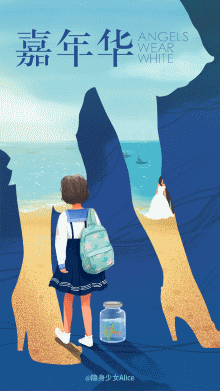
This is another Chinese film that I’m sure I picked up from Western sources as I don’t think it made too many waves within China itself. This is as far as I know the closest thing China currently has to a #MeToo film. It was directed by a woman Vivian Qu who is not very well known, having previously worked only as a producer. Indeed it’s straightforward and a little lacking in artistry but it does all the right things and sends the right message.
Xiaomi is a worker at a seaside hotel who is substituting for a colleague. One night a man arrives and registers for two rooms, bringing with him two underaged girls. The girls seem to be having fun and Xiaomi even delivers beer to their room. Later however she notices on the surveillance camera feed the man forcing his way into the girl’s room and makes a copy of the footage with her own phone. One of the two girls, Xiaowen’s behavior at school causes them to realize that something is wrong and a doctor’s examination reveals that she has been raped. The parents of both girls immediately realize who is responsible, a highly placed government official who is the godfather of one of them. A determined woman lawyer Hao helps the girls with the case but she is stymied by the official’s connections and Xiaomi’s reluctance to cooperate. It turns out that she too is underaged and undocumented to boot, so she is being illegally employed.
This is a fairly conventional film played straight, being exceptional mainly in that it is Chinese. It’s also wider in scope than the case of the two girls and clearly wants to show that women in China face abuse and mistreatment at the hands of men in many ways. Even the adult Lili who is the receptionist at the hotel and Xiaomi’s friend is sacrificed by her boyfriend to please his own middle-aged boss. I found it particularly courageous of the director to have even the serious-faced and competent police captain, normally an authoritative and incorruptible figure in Chinese media, be ultimately complicit in covering up the incident. It is telling that the only person who has the drive and the ability to help the girls is the lawyer Hao. A bit of artistic flair involves using a giant statue of Marilyn Monroe in her famous pose from The Seven Itch Year as a sort of emblem of both female empowerment and vulnerability. It’s a solid film that clearly looks to Western mores for inspiration.
I’m not clear on some of the details which rather detracts from this being a realistic portrayal of modern Chinese society. I don’t understand who Hao really works for, as it doesn’t seem that any of the parents hired her. I suspect that she is meant to be an activist, which would make sense, but the film isn’t allowed to say that because that would trip the censors. I also don’t quite understand why Xiaomi being undocumented is such a big deal since she is a Chinese citizen and her only crime is running away from home. Even the ending shows the influence of the Chinese government as they halfheartedly offer a happy ending that shows justice being done while the entire film is wailing about the powerlessness of women in society and how no one stands up for them.
On a more emotional level, I’m concerned that the film doesn’t show either Xiaowen or her friend being much affected by what happened to them. Xiaowen has plenty of problems but her main issue seems to be her relationship with her mother. Her friend Xinxin behaves as if nothing bad had happened at all and seems to not even understand what all the fuss is about. This has the effect of underselling the trauma which I don’t think is intended at all. Still I suppose that this might well be the best that they can do, working under legal and societal constraints in China. It is admittedly a big step forward and a solid effort all around.